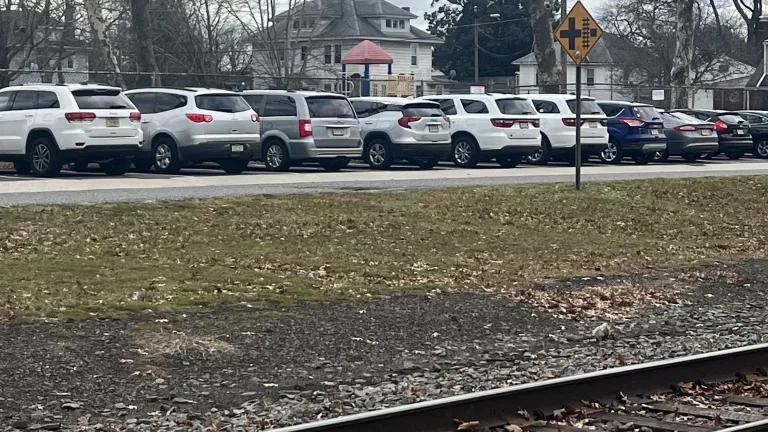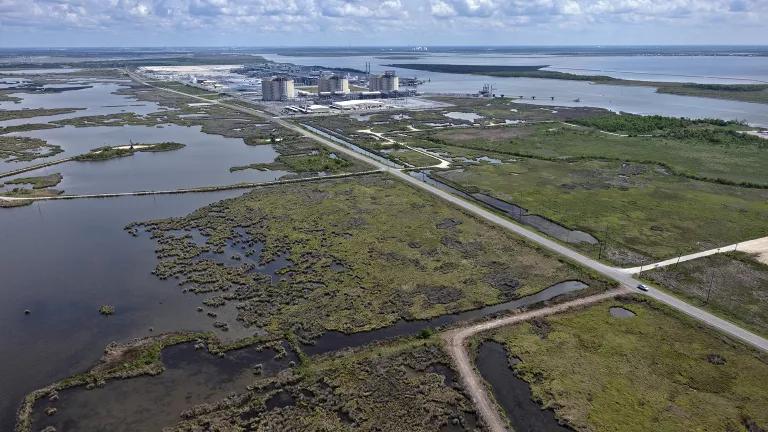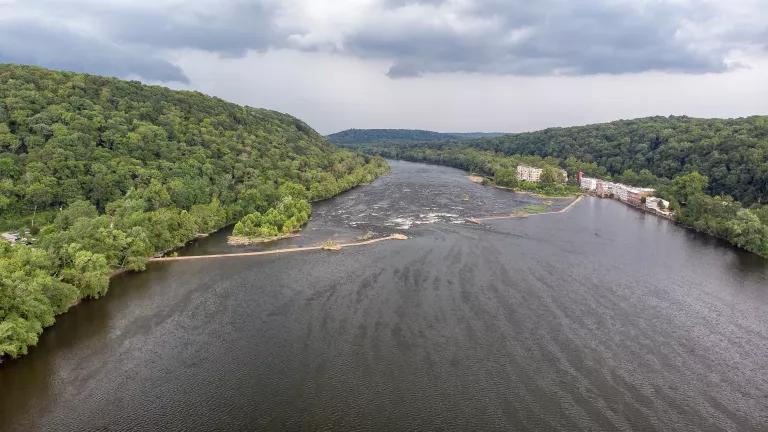The Gibbstown LNG Project Faced a Setback - Let's Stop It For Good
Despite the denial of a special permit to transport LNG by rail, the Gibbstown LNG Export Project can still proceed so long as a Trump-era rule remains in place

The Gibbstown LNG Export Project puts nearly 2 million people who live near rail lines, like the residents of this neighborhood in Gibbstown, NJ, at risk of dangerous fires and explosions from accidents involving trains transporting LNG.
Sahar Coston-Hardy for NRDC
In a blow to the Gibbstown Liquefied Natural Gas Export Project, the U.S. Department of Transportation has denied developers Energy Transport Solutions (an affiliate of New Fortress Energy) a special permit to transport liquefied natural gas (LNG) by rail from Wyalusing, PA to Gibbstown, NJ. For years, advocates have been fighting this dangerous proposal, which would endanger communities across eastern Pennsylvania and southern New Jersey. While those of us fighting the Gibbstown project support this action, we need to be very clear: denial of this special permit was necessary but not sufficient to stop the Gibbstown project. As long as a Trump-era regulation permitting LNG transport by rail remains in effect, Energy Transport Solutions may still transport LNG by rail from Wyalusing to Gibbstown.
What Is the Gibbstown LNG Export Project?
The Gibbstown project is a massive LNG processing, transport, and export operation that consists of three main components:
- A natural gas liquefaction plant in Wyalusing, Pennsylvania, where gas (methane) is converted into an extremely cold liquid state;
- A 200-mile-long “virtual pipeline” of hundreds of trucks and train cars transporting this LNG through eastern PA and southern NJ, including through heavily populated locations like Camden and Philadelphia; and
- An export terminal in Gibbstown, NJ, where the LNG would be loaded on mammoth tankers for export and use out of the country.
New Fortress Energy, the developer behind this project, operates through various affiliate entities (like Energy Transport Solutions) to move each of these components forward—and thereby gives the false impression that these components are not connected.

Little League football players crossing railway tracks to reach athletic fields in Gibbstown, New Jersey, where LNG transport by rail was proposed to take place.
J Henry Fair for NRDC
How Will the Gibbstown LNG Export Project Harm Communities and the Environment?
The Gibbstown LNG Export Project will endanger the nearly 2 million people living near its proposed truck and rail transport routes. LNG is a volatile substance that can lead to unstoppable fires and even explosions. Just 22 tank cars of LNG hold explosive energy equivalent to the Hiroshima atomic bomb. The rail disaster in East Palestine, Ohio, earlier this year underscored how serious—and how common—a train derailment involving hazardous substances can be. Moreover, vinyl chloride, one of the hazardous substances spilled in East Palestine, is a natural gas product also known for its volatility—just like LNG. Compared to vinyl chloride, however, LNG is even more dangerous and its harms more extensive.

Maps of the proposed truck and train routes along which LNG would be transported from Wyalusing, PA, to Gibbstown, NJ.
NRDC, Source: Delaware Riverkeeper Network
And the project is not just deadly for those who live in its vicinity. A natural gas project on this scale will accelerate the burning of dirty fossil fuels and exacerbate the global climate crisis. LNG consists of methane, which is a greenhouse gas over 80 times more potent at warming the planet than carbon dioxide over a 20-year period.
Encouraging further production of LNG through fracking will also perpetuate the ongoing air and water contamination that communities near fracking wells are suffering. And the Gibbstown project involves the construction and dredging of a historic Superfund site contaminated with carcinogenic chemicals called polychlorinated biphenyls. Disturbing contaminated soil and river sediment could dislodge these dangerous constituents into the Delaware River, which serves as a drinking water source for millions of people.
How Is NRDC Fighting the Gibbstown LNG Export Project?
NRDC and several coalition partners—including Delaware Riverkeeper Network, Food and Water Watch, Sierra Club New Jersey, Berks Gas Truth, Environment New Jersey, Catskill Mountainkeeper, and others—have been fighting this project on multiple fronts since its proposal. Among other things, we have opposed the project before the Delaware River Basin Commission, which ultimately approved it; challenged the U.S. Army Corps’ grant of a Clean Water Act permit for the project (this legal challenge is currently on hold); and petitioned the Federal Energy Regulatory Commission to exercise jurisdiction over the project (this petition is still pending). We are also fighting to get the U.S. Department of Transportation (DOT) to ban the transport of LNG by rail, a crucial aspect of the project.
How Can U.S. DOT Protect Our Communities from LNG Transport by Rail?
Historically, DOT prohibited LNG transport by rail unless a developer could obtain a special permit, which requires a close analysis of the proposal and a chance for affected members of the public to weigh in. But the Trump administration broke with decades of bipartisan precedent and passed a broad authorization allowing explosive LNG trains to tear through communities all over the country (the “LNG-by-rail rule”). If approved, the Gibbstown project would serve as the first test case, with Pennsylvania and New Jersey communities as the guinea pigs in a dangerous experiment.
When President Biden took office, among the first things he did was direct Secretary Buttigieg and DOT to review the Trump LNG-by-rail rule. Accordingly, DOT announced that it would propose a suspension of the Trump-era LNG-by-rail rule, and that it would subsequently release new regulations on LNG transport by rail informed by the latest research and consultation with experts.
Unfortunately, DOT has delayed suspension of the Trump-era rule three times. Initially slated for June 2022, then December 2022, the suspension was most recently expected by March 2023. But DOT has missed each of its deadlines, and we are still waiting for an update from DOT about when it will finally act.
DOT was also supposed to replace the Trump rule with a new one—and while this was initially due in September 2022, and then January 2023, and finally in March 2023, DOT has yet to announce a new timeline for proposing the replacement rule.
What’s Next?
Communities and advocates opposing the Gibbstown project cannot accept DOT’s delays in stopping LNG transport by rail. Affected community members rallied in March to call for action. Seven members of Pennsylvania’s congressional delegation have urged DOT to suspend the Trump LNG-by-rail rule. Eighteen New Jersey municipalities, eleven Pennsylvania local governments, and two Delaware municipalities have passed resolutions against LNG transport by rail. And a petition for a ban, which was drafted by a coalition of environmental organizations including Delaware Riverkeeper Network, Berks Gas Truth, Catskill Mountainkeeper, Clean Water Action, and Food & Water Watch, has already garnered more than 10,000 signatures.
We need to keep the pressure on Secretary Buttigieg and DOT to suspend the Trump rule so that communities across the country, and especially the communities between Wyalusing and Gibbstown, are protected from the specter of LNG by rail.
Sign here to tell Secretary Buttigieg that he must ban LNG by rail now.
This blog provides general information, not legal advice. If you need legal help, please consult a lawyer in your state.




